Small dog dog treats are more than just rewards. They’re key to training and bonding.
Small Dog Dog Treats:Every small dog owner knows the joy of seeing their furry friend’s tail wag at the sight of a treat. These little snacks do more than just fill a tiny tummy; they’re powerful tools for reinforcement and can even contribute to your pup’s health and well-being.
Selecting the right treats for your petite companion is crucial, as their small size and unique dietary needs require more than just a scaled-down version of a larger dog’s snack. This guide is here to help you navigate the vast world of small dog treats, ensuring you find the perfect bite-sized rewards that are both delicious and nutritious for your little pal. Get ready to discover the best treats that will keep your small dog happy and healthy, and make training a breeze.
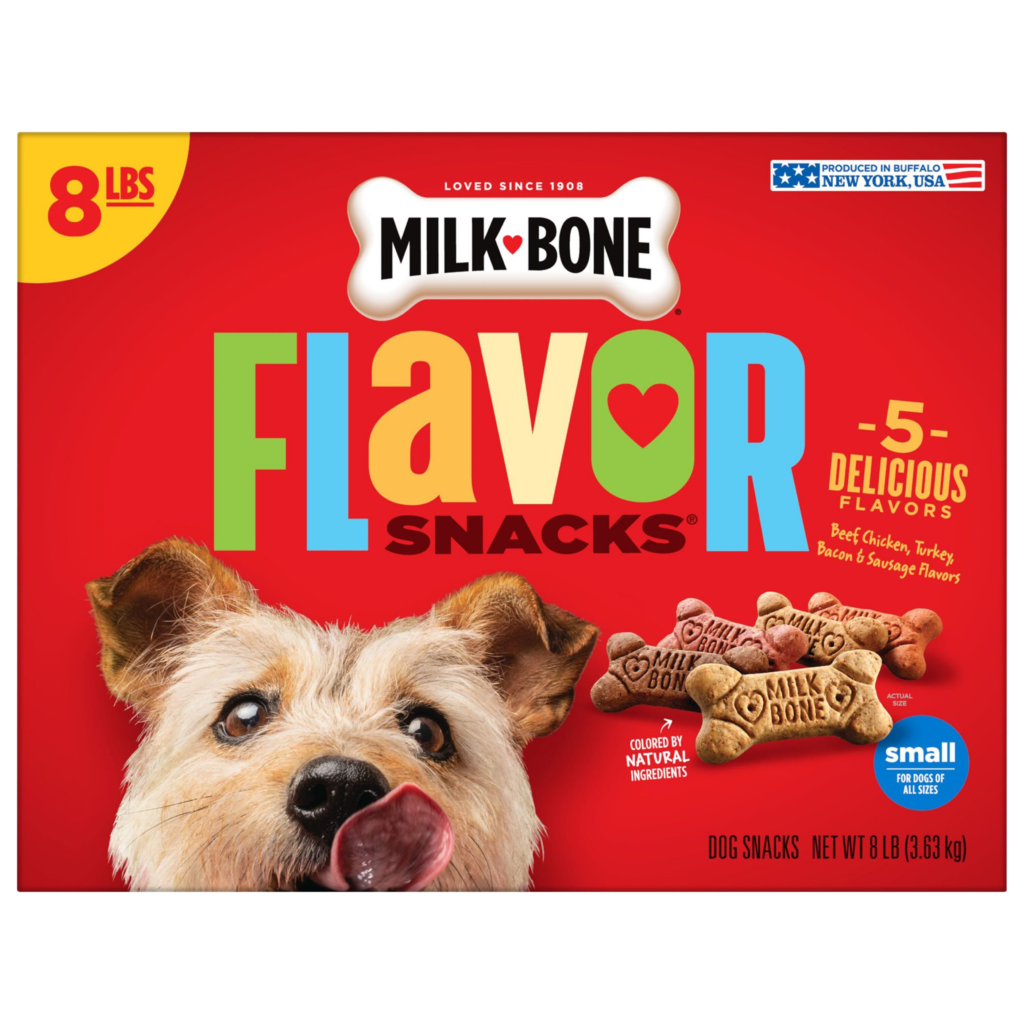
Credit: www.bjs.com
Introduction To Small Dog Nutrition
Small dogs have unique dietary needs. Their tiny bodies and fast metabolisms mean they require specially formulated treats and food to stay healthy. Picking the right treats for your small canine companion is crucial for their overall well-being.
Importance Of Size-specific Treats
Small dogs need treats that suit their small mouths and digestive systems. Regular treats can be too hard or large for them to enjoy. Size-specific treats ensure that small dogs can chew them easily and safely. These treats also prevent choking hazards and digestive issues.
Balancing Diet And Treats
While treats can be a good way to reward your pet, they should never replace meals. Treats should only make up a small part of a dog’s daily intake. Always balance treats with a nutrient-rich diet. This helps maintain your pet’s weight and health.

Credit: www.kroger.com
The Best Ingredients For Small Dog Treats
Finding the right treats for small dogs matters a lot. Small dogs have unique dietary needs. Owners want to give their pets the best. The best treats come from high-quality ingredients. These ingredients keep dogs healthy and happy. Let’s talk about what goes into these treats.
Natural Ingredients And Their Benefits
Natural ingredients mean better health for small dogs. Things like chicken, beef, and fish are great. They give dogs the protein they need. Fruits and vegetables matter too. They provide vitamins and minerals. Sweet potatoes are good for digestion. Blueberries support heart health. Natural ingredients do more than just taste good. They help dogs live long, healthy lives.
Ingredients To Avoid
Not all ingredients are good for small dogs. Some can be harmful. Avoid artificial colors and flavors. They offer no nutritional value. Chemical preservatives are bad too. Look for treats without these. Also, stay away from fillers like corn and soy. They can cause allergies. Choosing treats wisely makes a big difference in a small dog’s health.
Top 5 Treats For Your Tiny Companion
Small dogs deserve treats that fit their size and needs. Your tiny companion will love these top picks. Each treat type offers unique benefits. They keep your pet happy, healthy, and obedient. Let’s dive into the five best treats for small dogs.
Chewy Delights
Little dogs love to gnaw. Chewy delights satisfy that urge. They last long and keep dogs busy. These treats help clean teeth too. Choose ones that are soft enough. This ensures your pet’s dental safety.
Crunchy Bites
Crunchy bites offer a satisfying snap. They’re great for your dog’s oral health. Small shapes are perfect for tiny mouths. Look for natural ingredients. Your dog gets a tasty snack, plus vital nutrients.
Training Morsels
Training is a breeze with the right treats. Small, low-calorie morsels work best. They won’t spoil your dog’s appetite. Use them to reward good behavior. Your little friend stays motivated and learns faster.
Dental Health Chews
Teeth matter, even for small breeds. Dental health chews fight plaque and tartar. They freshen breath too. Pick the right size for your dog. This way, they can chew safely and improve dental health.
Homemade Goodies
Homemade treats show extra love. Use dog-safe ingredients. Avoid chocolate, grapes, and onions. Simple recipes can be found online. They ensure your dog gets a healthy, preservative-free treat.
Caloric Considerations For Small Breeds
Small dogs have unique dietary needs. Calories play a big role in their health. It’s crucial to get it right to avoid weight issues.
Understanding Calorie Needs
Little dogs need fewer calories than big dogs. But, their metabolism is fast. They burn energy quickly. A balance is key.
Each breed has its own calorie chart. Vet advice ensures the right numbers for your pet.
Treats Vs. Daily Food Intake
Treats add extra calories. They should not be more than 10% of total daily intake.
- Choose low-calorie treats.
- Check treat labels for calorie info.
- Remember to adjust meals if you give treats.
Monitoring treats helps maintain a healthy weight. Your pet stays happy and fit.
Allergies And Sensitivities
Small dogs often face allergies and sensitivities. This can make finding the right treats challenging. Owners need to understand these issues. It ensures their furry friends stay healthy and happy.
Identifying Common Allergens
Many small dogs react to certain foods. Common allergens include beef, dairy, and wheat. Symptoms may show as skin problems or stomach upset. Watching your dog’s reaction after eating can help identify the problem.
Hypoallergenic Snack Options
For dogs with sensitivities, choosing the right treats is crucial. Hypoallergenic options exist. They avoid common allergens. These snacks often use novel proteins like venison or fish. Vegetables and rice are also safe choices. These treats ensure your dog enjoys snack time without health risks.
Diy Snacks For Your Small Dog
DIY Snacks for Your Small Dog – a delightful way to treat your furry friend. Homemade treats are not only fun to make but also offer a healthier alternative to store-bought options. Let’s dive into creating simple, tasty snacks for your small pooch.
Easy Recipes To Try
Small dogs love tasty treats. Here are some quick recipes you’ll both enjoy.
- Peanut Butter Poppers: Mix natural peanut butter with oats and roll into bite-size balls. Freeze for a cool treat.
- Chicken Bites: Cook lean chicken, chop finely, mix with cooked rice and freeze in small portions.
- Apple Crunch: Remove apple seeds, slice thinly, and bake until crispy.
Preparation Tips
Make snack time safe and fun with these tips.
- Choose the right size treats for your dog’s mouth.
- Use fresh, dog-safe ingredients.
- Store snacks in a cool, dry place to keep them fresh.
Treats For Training And Rewards
Small dogs love treats. They help with training and giving rewards. Let’s talk about how treats can make teaching new tricks easier.
Positive Reinforcement With Treats
Treats make training fun. Dogs want to please us. Give a treat when they do well. This tells them they did a good job. Soon, they learn new tricks. Always use treats to say “well done”.
- Start with a simple command.
- Give a treat for each success.
- Repeat until they learn.
Choosing The Right Size And Texture
Small dogs need small treats. Big treats can be hard for them. Soft treats are good for young or old dogs. Crunchy treats are good for healthy teeth.
| Dog Age | Treat Type |
| Puppies | Soft |
| Adults | Crunchy |
| Seniors | Soft |
Choose treats wisely. Small, soft or crunchy, they matter. They keep your dog healthy and happy. Always pick the right size and texture.
Storing And Maintaining Treat Freshness
Small dogs have unique dietary needs, and their treats play a crucial role in their health and happiness. Keeping those treats fresh is just as important as choosing the right ones. Fresh treats ensure the nutritional value remains intact and your furry friend always gets the best. Let’s dive into how to store and maintain the freshness of small dog treats.
Proper Storage Solutions
Correct storage keeps treats tasty and safe. Use airtight containers to lock in freshness. These containers can be glass jars or specialized pet treat canisters. Keep them in a cool, dry place away from direct sunlight. Avoid plastic bags as they may not provide enough protection from air and moisture.
- Airtight containers: Prevents staleness and spoilage.
- Cool, dry place: Keeps treats from degrading.
- Avoid humidity: Prevents mold growth.
Shelf Life Of Popular Treats
Different treats have varied shelf lives. Check expiration dates on packaging. Dry biscuits typically last longer than soft chews. Homemade treats have a shorter shelf life and may need refrigeration.
| Treat Type | Shelf Life |
| Dry biscuits | 6-8 months |
| Soft chews | 2-3 months |
| Homemade | 1-2 weeks |
Always check treats for signs of spoilage like odor, mold, or discoloration before giving them to your pet. Freshness ensures your small dog enjoys their treats to the fullest while staying healthy.
Conclusion: Healthy Snacking For A Happy Pooch
A happy dog is a healthy dog, and the right treats play a crucial part. This section wraps up our guide on small dog treats. We aim for joy and well-being in every nibble.
Recap Of Top Treats
Our journey through the best small dog treats showed us variety is key. From chewy to crunchy, each treat has benefits. We saw ingredients that keep your dog’s tail wagging. We remembered size matters for little mouths. Taste and nutrition can go hand in hand.
Final Thoughts On Responsible Treating
Balance is vital. Treats should be part of a diet, not the whole. Watch portions and check with vets. Your dog’s health comes first. Love them with treats that care for their body and spirit. Healthy snacks mean a happy pooch.

Credit: shop.smucker.com
Frequently Asked Questions
What Are The Best Treats For Small Dogs?
Small dogs often thrive on treats designed for their size and dietary needs. The best treats are those that are low in calories, high in protein, and free from artificial additives. Look for soft chews or small-sized treats that are easy for them to digest.
How Often Should Small Dogs Get Treats?
Treats should not make up more than 10% of a small dog’s daily diet. Ideally, offering treats 2-3 times a day alongside regular meals is a healthy balance. Always consider the treat’s size and calorie content relative to the dog’s total dietary needs.
Can Small Dogs Have Dental Treats?
Yes, small dogs can have dental treats, but it’s crucial to choose the right size and type for their small mouths. Dental treats designed for small breeds can help reduce plaque and tartar buildup while also freshening breath. Always supervise your dog to ensure safe chewing.
Are Grain-free Treats Good For Small Dogs?
Grain-free treats can be a good option for small dogs, especially those with grain sensitivities or allergies. However, it’s important to ensure they still receive a balanced diet. Look for treats with healthy, alternative ingredients like sweet potato or pumpkin.
Conclusion
Choosing the right treats for your small dog is crucial. Think about size, nutrition, and taste. Your furry friend deserves the best, so go for quality treats. These snacks can help with training and bonding. Always check ingredients for your pet’s health.
Remember, a happy dog means a happy life. Treat your pup right, and they’ll thank you with endless tail wags!
Small dogs have big hearts and even bigger appetites for tasty treats! Picking the right snack for your pint-sized pooch is key.
Let’s dive into a world of flavors, nutrition, and pure tail-wagging joy that awaits your small dog. From crunchy bites to chewy delights, dog treats not only satisfy taste buds but also serve as powerful tools for training and health management.
Owners of small breeds know that their furry friends need treats that are size-appropriate, easy to chew, and packed with nutrients to support their energetic lifestyles. With a smorgasbord of options, the quest for the best treats can seem overwhelming.
This guide will point you to the best healthy dog treats designed for small dogs, highlight the top ingredients that cater to their unique dietary needs, and even share some homemade treat recipes that will have your dog doing the happy dance. We’ll explore low-calorie treats for weight-conscious pups, training treats that make learning new tricks a breeze, and grain-free options for those with sensitivities. Get ready to spoil your small dog with treats that are just as lovable as they are!

Credit: www.walmart.com
Best Healthy Dog Treats For Small Dogs
Discover top-notch treats tailored for small dogs, packed with health benefits. Choose these snacks for your petite pooch’s well-being and enjoyment.
When it comes to pampering our petite pooch pals, picking the perfect treat is paramount. Small dogs have specific dietary needs and preferences that can’t be overlooked. The quest for the best healthy dog treats for small dogs is one that necessitates careful consideration to ensure our furry friends are both happy and healthy.
What To Look For In Healthy Dog Treats For Small Breeds
Selecting the right snack for your small dog means considering size, texture, and nutrition. Here are key factors to bear in mind:
- Size of the Treat: Tailor the treat size to your dog’s petite mouth to prevent choking.
- Nutritional Content: Opt for treats rich in proteins, vitamins, and minerals, and low in calories.
- Natural Ingredients: Choose treats with whole-food ingredients and without artificial additives.
The Benefits Of Soft Chew Treats
Soft chews are often a go-to for small dogs due to their ease of consumption. Beyond being easy on the teeth, they offer several advantages:
- Gentle on Dental Health: Ideal for dogs with sensitive teeth or those who are older.
- High Palatability: The texture and taste can be more appealing to picky eaters.
- Versatility: Soft treats can be used for training due to their quick consumption.
Top Picks For Organic Dog Treats
It’s no secret that organic treats are a wholesome option. They’re free from pesticides and synthetic fertilizers, making them a super choice for your dog’s health. Consider treats that feature:
- Certified Organic Ingredients: Ensures the ingredients are grown without harmful chemicals.
- Sustainability: Often, organic treats are produced with eco-friendly practices.
- No Artificial Preservatives: Look for treats preserved naturally to avoid unnecessary chemicals.
How To Choose Grain-free Options
Grain-free treats cater to dogs with specific dietary restrictions or allergies. Here’s what to keep in mind:
- Identify Allergies: Know your dog’s sensitivities and opt for treats that won’t cause reactions.
- Read Labels Carefully: Ensure the treats are truly grain-free, with no hidden grain content.
- Balance the Diet: If your dog’s main diet includes grains, grain-free treats can provide dietary variety.
Treats With Dental Benefits
Dental treats do double duty: they’re tasty and help clean your dog’s teeth. They work by:
- Reducing Plaque Buildup: The treat’s texture can help scrub away plaque.
- Freshening Breath: Ingredients like mint can combat bad dog breath.
- Providing a Fun Chew Experience: Keeps your dog entertained while promoting oral health.
By focusing on these aspects, you can ensure that your small dog enjoys treats that are not only delicious but also beneficial for their overall well-being. Remember, moderation is key – treats should complement a balanced diet, not replace it.
Happy treating!
Top Ingredients To Look For In Treats For Small Breeds
Selecting the right treats for small dogs is crucial for their health. Look for high-quality proteins and digestible grains. Avoid artificial additives to ensure your petite pup gets only the best.
When picking treats for your small canine companion, it’s crucial to consider their unique nutritional needs. Small dogs have faster metabolisms, so they can benefit from energy-boosting ingredients packed into bite-sized treats. Here are some top-notch ingredients that are both beneficial and safe for your little buddy.
High-quality Proteins
- Animal-based proteins: These are essential for muscle development and overall health. Look for treats with chicken, beef, or fish as the main ingredient.
- Eggs: A great source of easily digestible protein, perfect for small dogs with sensitive stomachs.
Healthy Fats
Small dogs need fats for energy and to support their shiny coats. But remember, moderation is key as too much fat can lead to weight gain.
- Omega-3 fatty acids: These support skin and coat health. Ingredients like fish oil or flaxseed are rich in omega-3s.
- Chicken fat or oil: A good source of omega-6 fatty acids, which are vital for a balanced diet.
Wholesome Carbohydrates
- Brown rice: It’s a healthy carb that provides energy and is gentle on a small dog’s digestive system.
- Sweet potatoes: Packed with fiber and vitamins, they’re a nutritious choice for your dog’s treats.
Vitamins And Minerals
Your dog’s treats should be more than just tasty. They should offer a boost of vitamins and minerals for optimal health.
- Vitamin E: Supports immune function and skin health. You can often find it in treats that contain plant-based ingredients.
- Calcium: Important for strong bones and teeth, especially for small breeds that are prone to dental issues.
Fibers For Digestive Health
A good treat also helps with digestion. Small dogs can have sensitive stomachs, so the right kind of fiber is important.
- Beet pulp: This is a gentle source of fiber that helps keep your dog’s digestive system running smoothly.
- Pumpkin: Not only is it fiber-rich, but it’s also a hit with most dogs.
No Artificial Additives
Lastly, treats for your small dog should be free from artificial colors, flavors, or preservatives. Natural ingredients are always the best choice for your pet’s health and well-being. Look for treats that boast about having no added artificial ingredients – your furry friend will thank you for it!
Homemade Dog Treat Recipes For Small Dogs
Delight your petite pup with homemade dog treat recipes tailored for small dogs. Craft tasty, bite-sized snacks right in your kitchen using simple ingredients that cater to their size and dietary needs.
Treating your small dog to homemade delights not only nourishes their body but also strengthens your bond. Let’s dive into some simple yet tasty recipes that will have your furry friend wagging their tail in joy.
Peanut Butter Pumpkin Treats
This recipe is a hit among small dogs, combining the richness of peanut butter with the health benefits of pumpkin.
Ingredients you’ll need:
- Pumpkin puree: A great source of fiber.
- Peanut butter: Ensure it’s xylitol-free for safety.
- Eggs: For binding and added protein.
- Whole wheat flour: For the dough.
Steps to follow:
- Preheat your oven.
- Mix all ingredients to form a dough.
- Roll out and cut into shapes.
- Bake until golden.
Your dogs will love the chewy texture and the taste.
Chicken And Rice Balls
Dogs adore the taste of chicken, and these rice balls are perfect for sensitive stomachs.
Here’s how you can make them:
- Cooked chicken: Shredded finely.
- Cooked rice: Acts as a filler and is gentle on the tummy.
- Parsley: For fresh breath.
Combine the chicken, rice, and parsley. Form small balls. Serve them up!
These treats are not only delicious but also easy to digest, making them ideal for smaller breeds.
Sweet Potato Fries
Sweet potatoes are a fantastic source of vitamins and fiber. Making fries out of them is both simple and nutritious.
Steps for this snack:
- Slice sweet potatoes thinly.
- Toss with a bit of oil.
- Bake until crispy.
Your dog will enjoy the crunchy texture and sweet taste. Plus, it’s healthy!
Cheesy Delight Biscuits
For dogs who love cheese, these biscuits are a creamy dream come true.
Ingredients include:
- Whole wheat flour: For the base.
- Shredded cheese: Choose a low-fat option.
- Beef broth: For flavor and moisture.
Mix, roll, cut, and bake. That’s it! These cheesy biscuits are sure to be a hit.
By preparing these homemade treats, you’re not just giving your dog something tasty. You’re also ensuring they’re eating healthy, wholesome snacks. Start baking today and watch your little dog leap for joy!
Low-calorie Treat Options For Small Dogs
Finding the right treats for small dogs can be tricky. Low-calorie options offer a healthy choice. They keep your pet happy without adding extra pounds.
Finding the perfect treat for your pint-sized pooch can be quite the hunt. Small dogs have specific dietary needs that can’t be overlooked, especially when it comes to their treats. Low-calorie options are a great way to reward them without the risk of unnecessary weight gain.
Let’s dig into some tasty yet healthy choices that will have your little furball wagging with joy.
Homemade Veggie Treats
Making treats at home can be a fun and rewarding process. It allows you to control the ingredients, ensuring your dog gets the best nutrition:
- Carrot sticks: These are not only low in calories but also help in cleaning your dog’s teeth.
- Green beans: Crunchy and nutritious, green beans are a great snack that’s low in calories.
- Sliced apples: Without the seeds, apples can be a sweet, fiber-rich treat.
Store-bought Low-calorie Treats
Sometimes convenience is key, and there are plenty of healthy, store-bought options for your small dog. Here are some top picks for low-calorie treats:
- Dried fish skins: These treats are high in omega-3s and low in fat.
- Rice cakes: Plain rice cakes can be broken into small pieces for a low-cal treat.
- Freeze-dried liver: Rich in protein and low in fat, these treats are a hit with dogs.
Remember, moderation is crucial. Even low-calorie treats should be given sparingly to keep your small dog in tip-top shape. Enjoy the tail wags and happy dances that come with treat time, knowing you’re keeping your furry friend healthy and energetic.
Training Treats: Perfect Rewards For Small Breeds
Training treats sized for small breeds make rewarding your pint-sized pooch a breeze. Tailored for tiny mouths, these dog treats keep training fun and effective for your little companion.
When training your pint-sized pup, the right treats can make all the difference. Smaller dogs have tiny tummies, so choosing the correct training rewards is crucial to keep them healthy and eager to learn. Let’s explore the best training treats specifically designed for your small breed’s nutritional needs and training success.
The Benefits Of Size-appropriate Treats
Small dogs require treats that are just the right size for their little mouths and digestive systems. Here’s why choosing the correct size matters:
- Portion control: Small treats prevent overfeeding, which is especially important for breeds prone to obesity.
- Easy to chew: Smaller treats are easier for little jaws to manage, making the training process smoother.
Choosing The Right Ingredients
What goes into your dog’s training treats is just as important as the size. For small breeds, the ideal treats should have:
- High-quality protein: Look for treats with real meat or other protein sources that provide the energy they need.
- Low-calorie count: Since training often involves frequent rewards, low-calorie treats help maintain a healthy weight.
- No artificial additives: Treats free from artificial colors, flavors, and preservatives are better for your dog’s overall well-being.
Frequency Of Treats During Training
Training is all about consistency and timing. With treats as a motivator, consider the following:
- Reward immediately: Give the treat right after the desired behavior to reinforce the connection.
- Limit treats outside of training: To keep treats effective as a training tool, limit their use to training sessions.
Best Practices For Treat Storage
Keep your dog’s treats fresh and tasty with these tips:
- Airtight containers: Store treats in airtight containers to maintain freshness and prevent spoilage.
- Cool, dry place: Keep treats away from heat and moisture to avoid mold and bacteria growth.
Training your small dog can be a joy with the right treats in your toolkit. Remember, the goal is to reward good behavior without overfeeding. Choose wisely, and your little learner will be performing tricks in no time!
Grain-free Dog Treats For Small Dogs With Sensitivities
Pamper your petite pooch with grain-free treats crafted for dogs with sensitivities. These snacks are perfect for small dogs, offering both nutrition and taste without common allergens.
Finding the perfect treat for your small dog with sensitivities can feel like a big task. But don’t worry, grain-free dog treats are a fantastic option. They’re gentle on the stomach and full of flavor. Let’s dive into why these treats are a must-have for your furry friend.
What Makes Grain-free Treats Special?
Grain-free dog treats stand out because they don’t have wheat, corn, or soy. These are common allergens for dogs. Instead, these treats use ingredients like sweet potatoes, peas, and lentils. They provide energy without the upset stomach. Perfect for dogs with food sensitivities.
Best Ingredients In Grain-free Dog Treats For Small Dogs
Choosing the right treats involves looking at the ingredients list. Here are some top picks:
- Meat as the first ingredient: This means the treat is high in protein, which is good for your dog’s muscles.
- Vegetables and fruits: They add vitamins and minerals. This keeps your dog healthy and happy.
- No artificial colors or flavors: These can upset your dog’s stomach. Natural is always better.
Remember, treats are part of a balanced diet. Always check with a vet before making changes to your dog’s food. Happy treating!
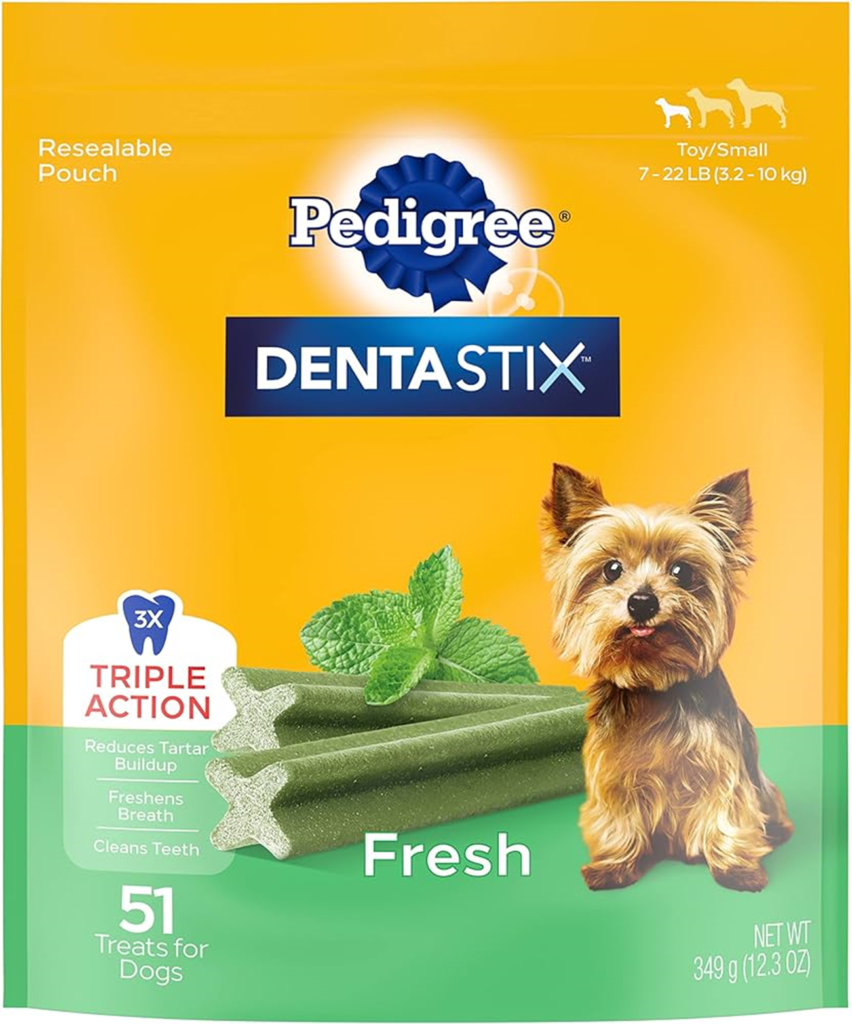
Credit: www.amazon.com
Frequently Asked Questions
What Are The Best Dog Treats For Small Dogs?
The best dog treats for small dogs are those that are specifically designed for their smaller mouths and dietary needs. Look for treats that are high in protein, have natural ingredients, and are appropriately sized to prevent choking hazards. Treats made with real meat or vegetables as the primary ingredients are excellent choices.
What Ingredients Should I Look For In Small Breed Dog Treats?
For small breed dog treats, prioritize ingredients like lean meats, whole grains, and fresh vegetables. Avoid treats with artificial colors, flavors, or preservatives. Ingredients like chicken, sweet potato, and brown rice are beneficial, offering a mix of high-quality protein and essential nutrients.
Can I Make Homemade Treats For My Small Dog?
Absolutely! Making homemade dog treats for your small dog is a great way to ensure they’re getting wholesome, healthy snacks. Simple recipes often include ingredients like pumpkin, peanut butter, and oats. Homemade treats allow you to cater to your dog’s taste preferences and dietary needs.
Table of Contents
Are There Low-calorie Treats Suitable For Small Dogs?
Yes, there are low-calorie treat options perfect for small dogs, especially for those watching their weight. Look for treats with natural ingredients, such as fruits and vegetables, that offer nutritional benefits without the extra calories. Small pieces of carrots or apples can be great low-calorie treats.
Conclusion
Choosing the right treats for your small dog matters. Look for top ingredients to keep them healthy. Consider homemade recipes for a personal touch. Low-calorie options are great for weight control. Use training treats as tiny, tasty rewards. For sensitive pups, grain-free is the way to go.
Treats are more than snacks; they’re tools for bonding and training. Pick wisely and watch your small dog thrive with each bite. Remember, a little treat goes a long way for your little friend.


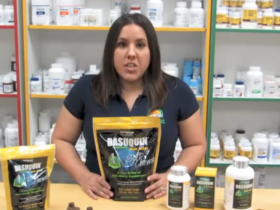
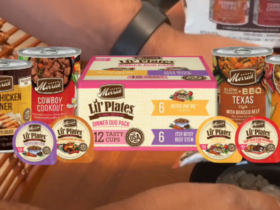
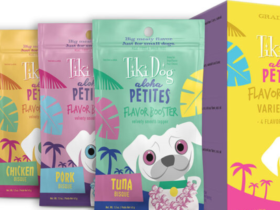
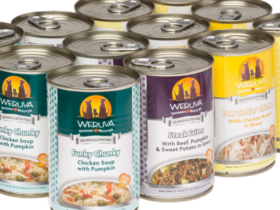
Leave a Reply